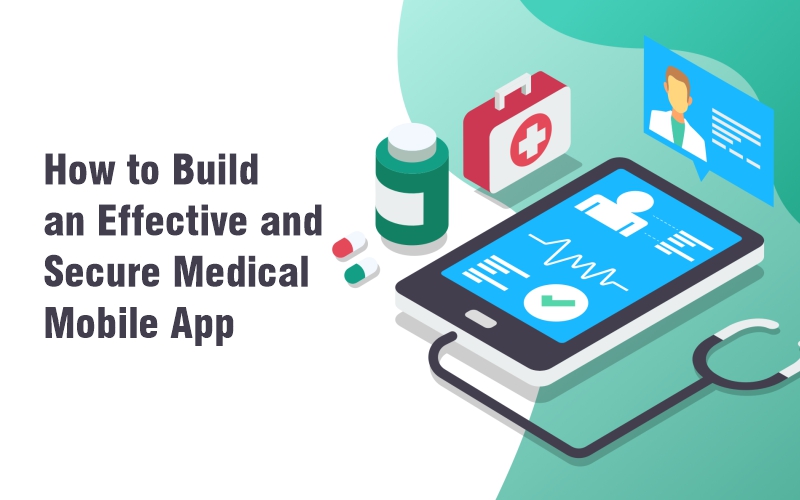How to Build an Effective and Secure Medical Mobile App?


Today, people seem more involved in their healthcare choices; whether it is a medical app or a fitness app, you will find millions of installs on the app store. And why not? These apps allow them to monitor their health conditions and nutrition levels, keep their health records safe, and provide a platform to interact with care providers via multiple formats. We all know that the Healthcare sector deals with sensitive data and information; therefore, building a mobile medical app is essential. The medical app not only protects patient data but also reduces the risk for healthcare organizations and providers. These all are great reasons to build a medical app.
But creating a medical app is not an easy task; several factors need to be considered that are flexible, reliable, and secure. This post highlights how to build a medical mobile app.
Decide the type of medical app you want to build- In the healthcare sector, there are several types of medical apps available, including-
- Clinical assistance apps
- Scheduling and reminder apps
- Medical resource and education apps
- Health and lifestyle apps
- Telehealth and remote monitoring apps
Before starting the development process, you need to identify the type of application with which your idea fits perfectly. It is essential to determine the category first as it results in the development of meaningful apps that are reliable for both patients and care providers.
Understand the target market- Before creating any new product, businesses must understand the target market; it will help them make their product or services more useful and robust. If we talk about the healthcare sector, then not every app comes under the same government guidelines. For example, an application available for physicians to understand radiology has a different set of compliance and regulations than an app that reminds patients of their timely medication. Hence, before building a mobile medical app, it would be best to understand the target market so that you will know the exact legislative points and make your app conflict-free.
Research the HIPAA Compliance- Privacy is one of the biggest concerns in building a mobile medical app. To develop a healthcare app, you need to get certification from HIPPA. Every healthcare app needs to follow the HIPAA guidelines; it is one of the biggest and essential regulations that ensures the patient’s data security. However, every medical app requires a different level of HIPAA compliance. The compliance entirely depends upon the kind of information your application shares. Therefore, to understand the type of HIPAA compliance for your medical application, consult with a healthcare lawyer that helps you with the best solutions.
Decide the app platform and devices to support your app- A medical app requires a robust platform and operating system to successfully deliver its functions. You need to determine what type of devices can give users quick and prompt access to your app. Devices can be-
- Mobile devices- smartphones, tablets, and smartwatches
- Desktop devices- computers and laptops
Apart from the devices, the next crucial factor is the platform on which you want to build your app. iOS and Android are the two prominent platforms on which every application is made. You can choose the one depending upon the number of potential users and demand or go for both. The choice entirely depends upon the analytics and clients’ requirements.
Functions matter the most- An application without proper functioning has no use. It would be best if you determined what functions will serve the best to your users. Once you have decided what type of app to build, on which platform and device, you can start thinking about the features you want to implement in your medical application. Make sure to cover all the features that fulfill the motive of your app. Following are the few essential features that every healthcare app must-have-
- Dashboard
- User’s Profile
- Doctor Profile
- Schedule an appointment
- E-Prescription
- Medical documents upload
- Report Management
- Payment system
- Telemedicine
Apart from these basic features, you can also implement the advanced features that make your app more demanding. Following are the examples of some features-
- Wearable Integrations
- One-click Ambulance
- AI assistance
- Geo-location
- Prescription reminders
- Access to EHR/EMR
UI/UX Designs must be accessible- Effective and appealing designs are a must for a medical app. An application with a useful user UI and UX design has a great success chance. Before finalizing any design, always try to consider your user’s pain points. Always go for a simple, clean, and uncomplicated graphic design so that your users can understand your application quickly. To provide a seamless experience, deliver the necessary information at first; it helps hold your user for a long time at the platform. Remember, UI/UX doesn’t mean to color your app with several graphics; it’s about how softly a software can run, and people interact with it. The smoother the user-interaction, the more successful the application is.
It’s time to code your app- After considering the type, platform, features, designs, and devices, the last thing left is coding. Yet, not every company or developer is ready to build a mobile medical app. The majority of companies require outsourcing their project because it takes the right set of technical skills and experience to create a medical app. If you want to maintain the credibility standards, and enhance your application’s usability, hire a team of experienced medical app developers. These are the people who are going to make your app successful.
You can ask the following questions before hiring a team of medical app developers–
- Have you built an app that involves HIPAA Compliance before?
- Have you created an app with the latest technologies like Apple Health Kit?
- How many similar apps have you made to date?
Build an app that works for your users and help your business to reach new heights-
We hope that now you will get an idea about how to build a mobile medical app. Following the above points will help to create a medical app that serves best both patients and users.






